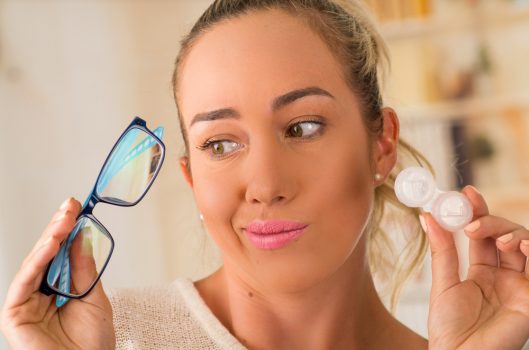If you are having difficulty with your vision it is time to visit your eye doctor. An eye doctor can help you make an assessment as to whether you need glasses or contacts. Many people prefer contacts or glasses for aesthetic reasons and of course comfort but there are still plenty of adults who have a lot of unanswered questions about contacts. Contacts can seem frightening if you don’t really understand the way it works which is why it is important to go over some of the basics.

First and foremost a lot of people worry whether the contact lens can get lost behind their eye. First and foremost, at worst it might get dislodged from its proper position and end up underneath your upper eyelid. If you cannot remove it yourself you can visit your doctor and they can remove it. But this is not likely to happen.
Age Minimums
Parents question at what age their children can get contact lenses. There is no industry minimum age. This is a parental decision one which is contingent upon how responsible your child is. Obviously, you can speak to your eye doctor and your child to make a better decision.
Types
There are two main types of contact lenses: soft and hard. There are different materials, different replacement schedules, and different wear schedules. Many people prefer either the extended wear contacts or the disposable contacts.
Replacement Schedules
Your Nashville eye doctor can prescribe a replacement schedule for you based on the material you use, the design of your contact lens, your lifestyle, and your eye condition.
Traditional soft lenses can last up to one year but the hard versions can last longer.
Frequent replacement lenses can last several months.
Disposable lenses typically last from one day to two weeks.
Wear Schedule
How long you can wear your contact lenses is based on the type. Daily wear contact lenses are lenses you must take out at night before you go to sleep. Extended wear contacts can be worn for a specific number of days and nights without being removed. Normally these can be worn anywhere from seven to thirty days.
There are special contact lenses that your Nashville Eye Doctor might recommend to correct your vision as you sleep. There are many varieties for many conditions including bifocal contact lenses and orthokeratology lenses. There are also specialty lenses like colored contacts and theatrical contact lenses that people also use.

With that in mind, many people wonder if the disposable contact lenses are worth it. Doctors recommend them because they are a healthier option. With disposable contacts, there is less opportunity for bacteria to build up on your lenses. Moreover, you do not need to spend as much money on the cleaning solutions if you have disposable lenses because you are throwing them out at the end of the day.
So, what is the difference between the extended wear and daily wear lenses?
Extended wear contacts are constructed from the special material that allows more oxygen to reach your eye. This keeps your eyes hydrated and makes it safer for you to wear them while you sleep. It is the FDA who determines how long extended lenses can be worn for based on the brand. You will have to check the brands and discuss them with your doctor before you buy.
Your eye doctor will prescribe the lenses and you can order them right there. You can also order them online or at a retail store once you have your prescription. Comparison shopping for the lenses you need will help you to save money.
Related Article: Cataracts: Causes, Symptoms, and Possible Treatments
Once your doctor prescribes the contact lenses you will have to come back after one week to make sure you are not having any problems with them. About one year later your doctor will ask you to come back to see whether you need your prescription changed. During this appointment, your doctor will also check for eye diseases. It is always best to treat vision loss during the early stages before it has worsened. You can speak with your doctor and book an appointment today if you have any other questions or concerns.
References:
- http://www.allaboutvision.com/contacts/contact_lenses.htm
- https://en.wikipedia.org/wiki/Contact_lens
- http://opmt.com

